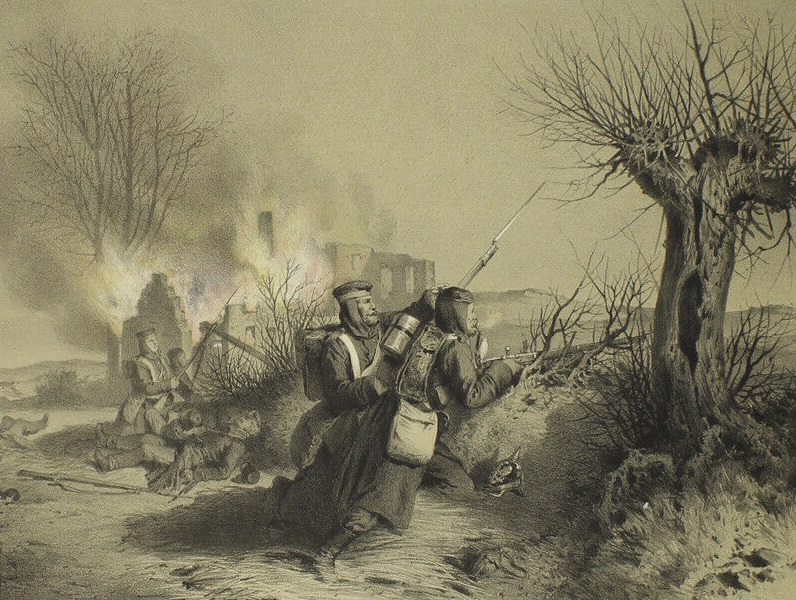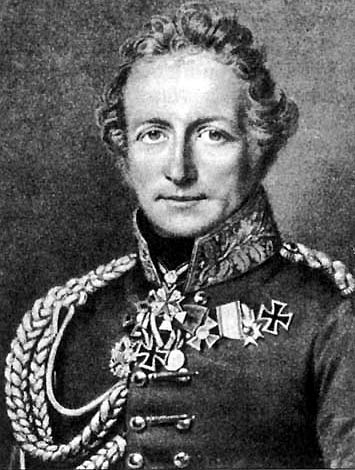Colonel von Wolfersdorf withdraws, also beautifully (August 15th).
Accordingly, Wednesday, August 15th, at eight in the morning, Wolfersdorf by the Elbe Gate moves out; across Elbe Bridge, and the Redoubt which is on the farther shore yonder. Near this Redoubt, Stolberg and many of his General Officers are waiting to see him go. He goes in state; flags flying, music playing. Battalion Hessen-Cassel, followed by all our Packages, Hospital convalescents, King’s Artillery, and whatever is the King’s or ours, marches first. Next comes, as rear-guard to all this, Battalion Grollmann;–along with which is Wolfersdorf himself, knowing Grollmann for a ticklish article (Saxons mainly); followed on the heel by Battalion Hofmann, and lastly by Battalion Salmuth, trusty Prussians both of these.
Battalion Hessen-Cassel and the Baggages are through the Redoubt, Prince of Stolberg handsomely saluting as saluted. But now, on Battalion Grollmann’s coming up, Stolberg’s Adjutant cries-out with a loud voice of proclamation, many Officers repeating and enforcing: “Whoever is a brave Saxon, whoever is true to his Kaiser, or was of the Reichs Army, let him step out: Durchlaucht will give him protection!” At sound of which Grollmann quivers as if struck by electricity; and instantly begins dissolving;–dissolves, in effect, nearly all, and is in the act of vanishing like a dream! Wolfersdorf is a prompt man; and needs to be so. Wolfersdorf, in Olympian rage, instantly stops short; draws pistol: “I will shoot dead every man that quits rank!” vociferates he; and does, with his pistol, make instant example of one; inviting every true Prussian to do the like: “Jägers, Hussars, a ducat for every traitor you shoot down!” continues Wolfersdorf (and punctually paid it afterwards): unable to prevent an almost total dissolution of Grollmann. For some minutes, there is a scene indescribable: storm of vociferation, menace, musket-shot, pistol-shot; Grollmann disappearing on every side,–”behind the Redoubt, under the Bridge, into Elbe Boats, under the cloaks of the Croats;”–in spite of Wolfersdorf’s Olympian rages and efforts.
At sight of the shooting, Prince Stolberg, a hot man, had said indignantly, “Herr, that will be dangerous for you (das wird nicht gut gehn)!” Wolfersdorf not regarding him a whit; regarding only Grollmann, and his own hot business of coercing it at a ducat per head. Grollmann gone, and Battalion Hofmann in due sequence come up, Wolfersdorf,–who has sent an Adjutant, with order, “Hessen- Cassel, halt,”–gives Battalion Hofmann these three words of command: “Whole Battalion, halt!–Front!–Make ready!” (with due simultaneous click of every firelock, on utterance of that last);– and turning to Prince Stolberg, with a brow, with a tone of voice: “Durchlaucht, Article 9 of the Capitulation is express on this point; ‘All desertion strictly prohibited; no deserter to be received either on the Imperial or on the Prussian side’!” (Durchlaucht silently gives, we suppose, some faint sniff.) “Since your Durchlaucht does not keep the Capitulation, neither will I regard it farther. I will now take you and your Suite prisoners, return into the Town, and again begin defending myself. Be so good as ride directly into that Redoubt, or I will present, and give fire!”
A dangerous moment for the Durchlaucht of Stolberg; Battalion Salmuth actually taking possession of the wall again; Hofmann here with its poised firelock on the cock, “ready” for that fourth word, as above indicated. A General Lusinsky of Stolberg’s train, master of those Croats, and an Austrian of figure, remarks very seriously: “Every point of the Capitulation must be kept!” Upon which Durchlaucht has to renounce and repent; eagerly assists in recovering Grollmann, restores it (little the worse, little the fewer); will give Wolfersdorf “command of the Austrian Escort you are to have”, and every satisfaction and assurance;–wishful only to get rid of Wolfersdorf. Who thereupon marches to Wittenberg, with colors flying again, and a name mentionable ever since.
This Wolfersdorf was himself a Pirna Saxon; serving Polish Majesty, as Major, in that Pirna time; perhaps no admirer of “Feldmarschall Brühl” and Company?–at any rate, he took Prussian service, as then offered him; and this is his style of keeping it. A decidedly clever soldier, and comes out, henceforth, more and more as such,–unhappily not for long. Was taken at Maxen, he too, as will be seen. Rose, in after times, to be Lieutenant-General, and a man famous in the Prussian military circles; but given always, they say, to take the straight line (or shortest distance between self and object), in regard to military matters, to recruiting and the like, and thus getting himself into trouble with the Civil Officials.













